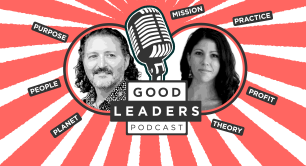Good Leaders Podcast Episode 15 – Kirsten Dueck: ‘Here’s what I knew: this was a place where a strong-minded female leader could flourish’
Kirsten Dueck took over the role of CEO at NESsT 18 months ago from a celebrated founder who had run the organisation for more than 25 years. She tells Tim West about stepping into the shoes of ‘the godmother of impact investing’, why imposter syndrome should be retired as a term, and how her organisation has been able to support thousands of social entrepreneurs to flourish across very different regions and cultures.
Love podcasts? Don't miss out on ours! Catch up on all our podcasts and subscribe free on Apple Podcasts, Spotify or Soundcloud.
“We invest in the people that are using the tools of business to address the great social challenges of our time,” says Kirsten Dueck, CEO of NESsT, a nonprofit which supports social enterprises that create jobs for underserved communities while also sustaining the environment.
Through investment, one-to-one consulting and mentorship, the organisation, which is headquartered in the US, helps mission-driven businesses across Central and Eastern Europe and South America to scale.
“A good way to think about what we do is venture philanthropy,” says Kirsten. She explains that NESsT invests in social enterprises in two ways: “through robust acceleration programmes, helping businesses around the world meet the challenges of scaling” and “through investment funds that work with and invest in midsize social enterprises that are a little bit farther along the continuum of scale”.
Founded in 1997, NESsT has invested over US$30m to grow over 200 social enterprises around the world and train more than 35,000 entrepreneurs.
When asked how the organisation has managed to translate its approach across different global regions and cultures, Kirsten says: “It happened, in part, by following the need. We have found ourselves operating most powerfully in regions that are emerging from a history of authoritarianism or totalitarianism… where there may not be the strong, robust public support for what then becomes the responsibility of small and midsize social enterprises to fill.”
- Read: NESsT and partners to deploy ‘power of social entrepreneurship’ for refugees in Poland and Romania
Dealing with ‘imposter syndrome’ as a woman in leadership
Leadership has always come naturally to Kirsten, who describes herself as having been “the bossy big sister” growing up. She says: “I really do love the creative power and potential of leadership. And when you do work that is extremely mission-driven, it can often feel like a calling that is calling on all parts of yourself: on your heart and on your head.”
However, she admits that during her role as vice president at Sotheby’s auction house, where she was just one of a “handful of women”, she had the misconception that being a leader meant that she “had to be in charge of everything, know everything, direct everything” to feel like she belonged. “It was hell on my staff and it was exhausting for me,” she says.
She adds: “For women in business, there’s so much talk about having ‘imposter syndrome’. I would actually love to retire that word forever because I often think it’s a way of telling people, women especially, that if they don’t know everything, they don’t really belong.”
She had a “wake up call” when her friend, who visited her at her workplace one day, said: “You are somebody that lives for connection. I know you have warm, loving, trustful relationships all around you. Why are you leaving that person at home when you go to work? I don't know who you're showing up as, but it doesn't feel like the person that I know. Why are you acting like that person doesn't have a place at work?”
It was a real mistake to imagine that I had to adopt a persona
Kirsten says she is lucky that this advice came early enough in her career for her to “be able to take it to heart and do something about it”. Since then, she has come to identify a leader as “someone who is leaning into their work with genuine authentic connection and curiosity” and says she has “allowed [herself] to come as [herself]”. “It’s a way that certainly makes you more vulnerable, but it was a real mistake to imagine that I had to adopt a persona.”
Her reformed mindset on leadership has helped her fill the shoes of “the godmother of impact investing”, NESsT co-founder Nicole Etchart, who stepped aside from the CEO role in November 2023 though still remains a senior advisor in the organisation. “I knew, coming in, that this was a place where a strong-minded female leader could flourish. We already had a culture of curiosity. Gender-lens investing is such a strong tenet of our approach.”
Tim West talks to Kirsten about:
- How her background in art history has moulded her into a problem solver who calls on “both creative and strategic thinking”
- Why her parents and in-laws are her biggest role models and she doesn’t have to “look far for sources of inspiration”
- How gardening, weekly chats with her college girlfriends and cooking with her family help her avoid burnout
The importance of measuring impact
When it comes to measuring impact, Kirsten says that NESsT does this with “such specificity”, having developed a performance management tool that “measures the granular impact of the work that the social enterprises do across about 20 different metrics”. This, she says, allows businesses to “see inside their own impact” and “understand how their specific business performance tracks against these social and environmental and governance measures”.
Alongside carrying out “extensive interviews every two years” with the social entrepreneurs they invest in, NESsT also uses the performance management tool itself so it can assess “the effect of applying their methodology” and share the outcomes with its acceleration partners.
How do we as impact investors cut through the noise and stay focused and clear?
The big question that rolls around in Kirsten’s head at night: “How do we as impact investors cut through the noise of anti-ESG and pro-ESG and stay focused and clear?” She adds: “It’s not [about] the bells and whistles, [it’s about] the real. Can we bring this back to reality? Can we show how it’s working?”
What’s the next big thing on the horizon for NESsT? Its newly launched Violet Fund based in Central and Eastern Europe, which Kirsten says is “the first of its kind in that region dedicated to strengthening LGBTQI-friendly workplaces”. The fund is aimed at financing high-impact enterprises that create jobs and inclusive workplaces for the region’s LGBTQ+ community.
Over the next five years, Kirsten says the organisation is focused on “the bigger question” of “the missing middle”: how it can “continue to close the gap between the acceleration of early-stage small social enterprises and investment-readiness as they grow”.
Thanks for reading Pioneers Post. As an entrepreneur or investor yourself, you'll know that producing quality work doesn't come free. We rely on our subscribers to sustain our journalism – so if you think it's worth having an independent, specialist media platform that covers social enterprise stories, please consider subscribing. You'll also be buying social: Pioneers Post is a social enterprise itself, reinvesting all our profits into helping you do good business, better.




